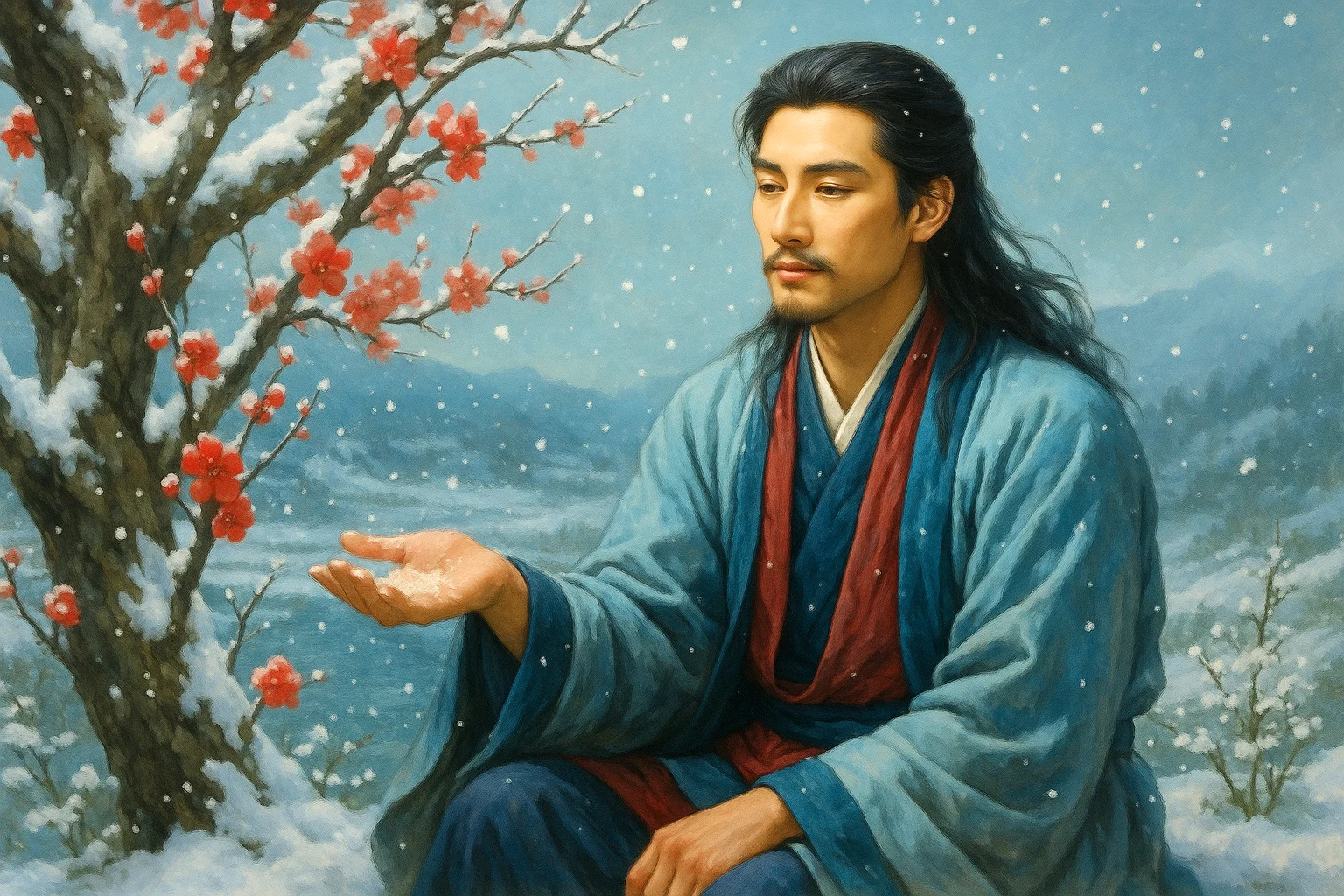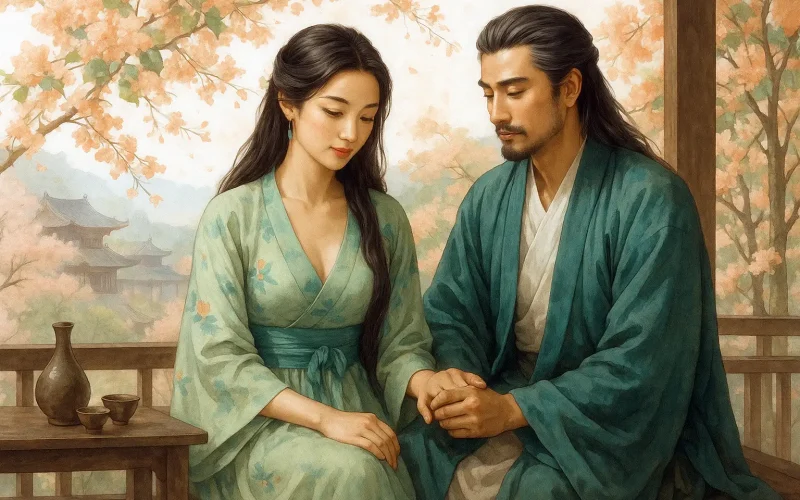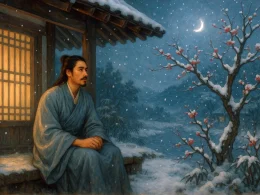First, the sorrowful poet chanted his dirge—
Then came the cricket’s whispered lament,
Dripping with dew on bronze doorplates,
Seeping through moss-choked stone wells,
In all the places it once sang.
A mournful tune, like pleading.
Sleepless, the longing wife rises
To pace by her loom.
Winding screen-painted hills—
What loneliness aches in the cooling night?
Rain taps softly at the west window.
For whom does this chirping start and stop,
Matching the pound of laundry mallets?
At frontier inns, it greets autumn;
In abandoned palaces, it mourns the moon—
A thousand other heartbreaks unfold.
The Book of Odes once casually praised it.
Children laugh, lighting lanterns by the fence—
But when its song is strung into zither strings,
Note by note, the sorrow deepens.
Original Poem
「齐天乐 · 蟋蟀」
庾郎先自吟愁赋,凄凄更闻私语。
露湿铜铺,苔侵石井,都是曾听伊处。
哀音似诉。正思妇无眠,起寻机杼。
曲曲屏山,夜凉独自甚情绪?西窗又吹暗雨。为谁频断续,相和砧杵?
姜夔
候馆迎秋,离宫吊月,别有伤心无数。
豳诗漫与。笑篱落呼灯,世间儿女。
写入琴丝,一声声更苦。
Interpretation
Composed during the Southern Song Dynasty, Jiang Kui's ci poem uses autumn cricket chirps as a motif to convey profound melancholy and reflections on personal destiny. Though focused on a small subject, through layered metaphors and symbolic imagery, it blends personal sorrow with national grief, creating a profound and expansive artistic conception. Historical allusions to Yu Xin and the "Bin Odes" enrich its emotional depth, subtly reflecting mid-Southern Song poets' nostalgia for the lost northern capital and lamentation over national collapse.
First Stanza: "庾郎先自吟愁赋,凄凄更闻私语。"
Yǔ láng xiān zì yín chóu fù, qī qī gèng wén sī yǔ.
First Yu Xin chanted sorrow's verse,
Now cricket whispers pierce the night—
What ghosts of grief the dark rehearse?
The stanza opens with Yu Xin's "Ode to Sorrow" (愁赋), establishing an intertextual lament. The crickets' "whispers" (私语) become spectral voices, their mournful cadence (凄凄) transforming natural sounds into expressions of grief.
"露湿铜铺,苔侵石井,都是曾听伊处。"
Lù shī tóng pū, tái qīn shí jǐng, dōu shì céng tīng yī chù.
Dew soaks the patterned bronze gate,
Moss creeps where stone wells stand—
All places where we heard her fate.
The "bronze gate" (铜铺) and "stone well" (石井) serve as memorial sites, their moisture (露湿) and erosion (苔侵) marking the passage of time while preserving auditory memories.
"哀音似诉。正思妇无眠,起寻机杼。"
Āi yīn shì sù. Zhèng sī fù wú mián, qǐ xún jī zhù.
Plaintive notes like whispered pleas—
Sleepless, she rises to her loom,
Weaving threads of memories.
The cricket's "plaintive notes" (哀音) mirror a lovelorn woman's sighs, with the loom (机杼) becoming a metaphor for unraveling thoughts. The parallelism between insect and human sounds deepens the elegiac tone.
"曲曲屏山,夜凉独自甚情绪?"
Qū qū píng shān, yè liáng dú zì shèn qíng xù?
Folding screens tower cold and tall,
Night chills the solitary soul—
What anguish grips this empty hall?
The "folding screens" (屏山) create psychological barriers, while the rhetorical question amplifies the speaker's isolation, culminating the autumnal melancholy motif.
Second Stanza: "西窗又吹暗雨。为谁频断续,相和砧杵?"
Xī chuāng yòu chuī àn yǔ. Wèi shéi pín duàn xù, xiāng hè zhēn chǔ?
West window drums with muted rain,
Pausing, resuming—for whose pain
Does it chant with pounding refrain?
The transition to "muted rain" (暗雨) connects cricket sounds to washing mallets (砧杵), layering aural textures. The interrogative "for whose pain" universalizes the grief.
"候馆迎秋,离宫吊月,别有伤心无数。"
Hòu guǎn yíng qiū, lí gōng diào yuè, bié yǒu shāng xīn wú shù.
Inns greet autumn, moonlit towers mourn,
Where exiled hearts are doubly torn—
What countless griefs in shadows borne.
"Travel lodges" (候馆) and "abandoned palaces" (离宫) shift to political exile imagery, with the moon (月) witnessing displaced loyalists' sorrows after the Song's fall.
"豳诗漫与。笑篱落呼灯,世间儿女。"
Bīn shī màn yǔ. Xiào lí luò hū dēng, shì jiān ér nǚ.
The Bin Odes' rustic melody
Drowns in children's lantern glee—
What do they know of misery?
The "Bin Odes" (豳诗) allusion contrasts with children's laughter, highlighting generational disconnect. The irony underscores the poet's unshared grief.
"写入琴丝,一声声更苦。"
Xiě rù qín sī, yī shēng shēng gèng kǔ.
Strummed into zither strings,
Each pluck a sharper sorrow sings—
Music bears what words can't bring.
The zither (琴丝) finale transmutes grief into art. The crescendo of "sharper sorrow" (更苦) suggests inexpressible pain, leaving reverberating silence.
Holistic Appreciation
This lyric poem takes the autumn-night chirping of crickets as its central motif, unfolding in layers that interweave personal sentiment, women's lamentations, and the vicissitudes of history. Opening with an allusion to Yu Xin's "Ode to Sorrow," the latter stanzas echo with the rhythmic pounding of laundry mallets - employing the classical allusion of homesick wives beating cloth to connect personal longing with national destiny. The emotional depth transcends ordinary object poetry. Lines like "travelers' lodges greeting autumn" and "abandoned palaces mourning the moon" serve not merely as scenic depictions, but conceal profound grief for the Southern Song's precarious existence and the plight of loyalists to the fallen dynasty. The concluding phrase "poured into zither strings" elevates the entire lyric to a sublime plane of expression, transforming ineffable sorrow into musical resonance that lingers in the air with timeless poignancy.
Artistic Merits
- Transcending the Literal Subject: While ostensibly depicting crickets, the poem uses their chirping to evoke autumnal melancholy, lament for the past, and reflections on nationhood—elevating its thematic scope.
- Layered Imagery with Progressive Depth: The poem transitions from the sound of insects to rain, then to washing mallets, abandoned palaces, and traveler's lodges—blending scene and sentiment, event and meaning into an interconnected whole.
- Natural Allusions Blending Emotion and Reason: References to Yu Xin's "Ode to Sorrow" and the "Bin Wind" chapter from the Book of Songs lend historical depth to the lyrical contemplation, enriching its gravity.
- Artful Use of Contrast: The joyful cries of children calling for lanterns starkly offset the inner sorrow of adults, intensifying the emotional contrast and deepening the sense of lament.
- Ethereal and Resonant Conclusion: The poem closes with music—channeling ineffable grief into "zither strings," leaving boundless implications lingering in the air.
Insights
This lyric demonstrates how the minutiae of an insect's sound can unfold into the vastness of historical change and human sorrow. It teaches us that ordinary things contain pathways to profound historical and emotional depths. Truly moving literature depends not on "grand themes" but on the ability to express life's pains and the heart's grief with delicate subtlety. Through an autumn lyric, Jiang Kui strings together dynastic decline, personal fate, and women's silent yearning—revealing how literary power springs from authentic emotion and refined expression.
About the poet

Jiang Kui (姜夔, c. 1155 - 1221), a native of Poyang, Jiangxi, was a Southern Song Dynasty lyric poet and musician. He remained a commoner throughout his life. His lyrics are known for their ethereal and austere style, and his poetry is also highly regarded. Along with Fan Chengda and Yang Wanli, he is celebrated as one of the "Four Great Masters of the Restoration."












